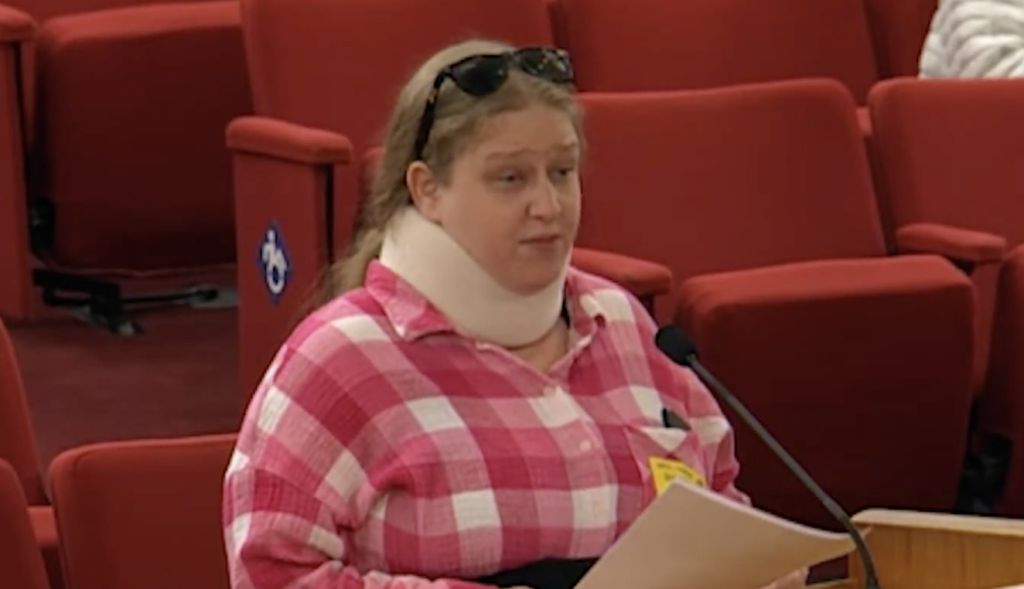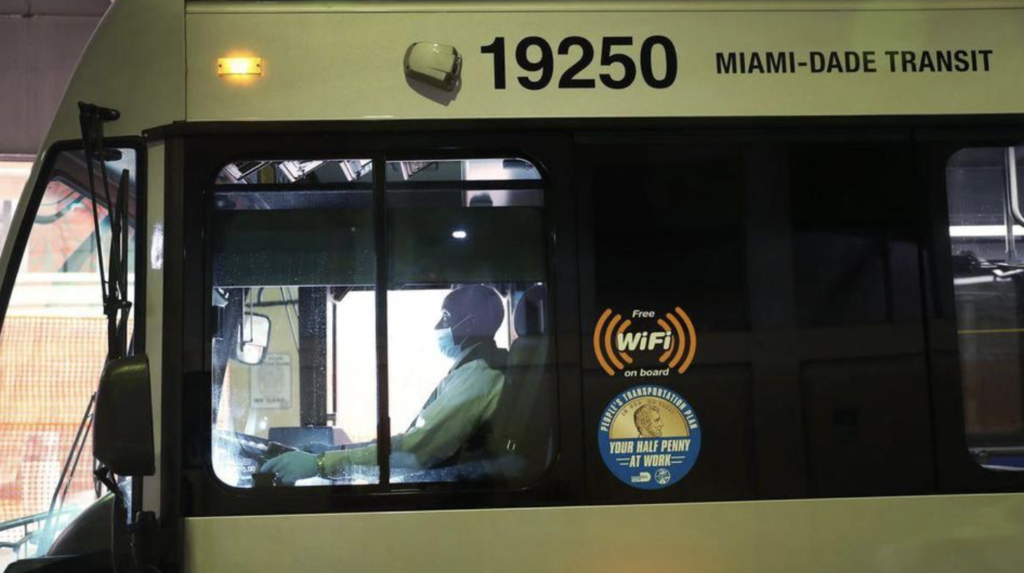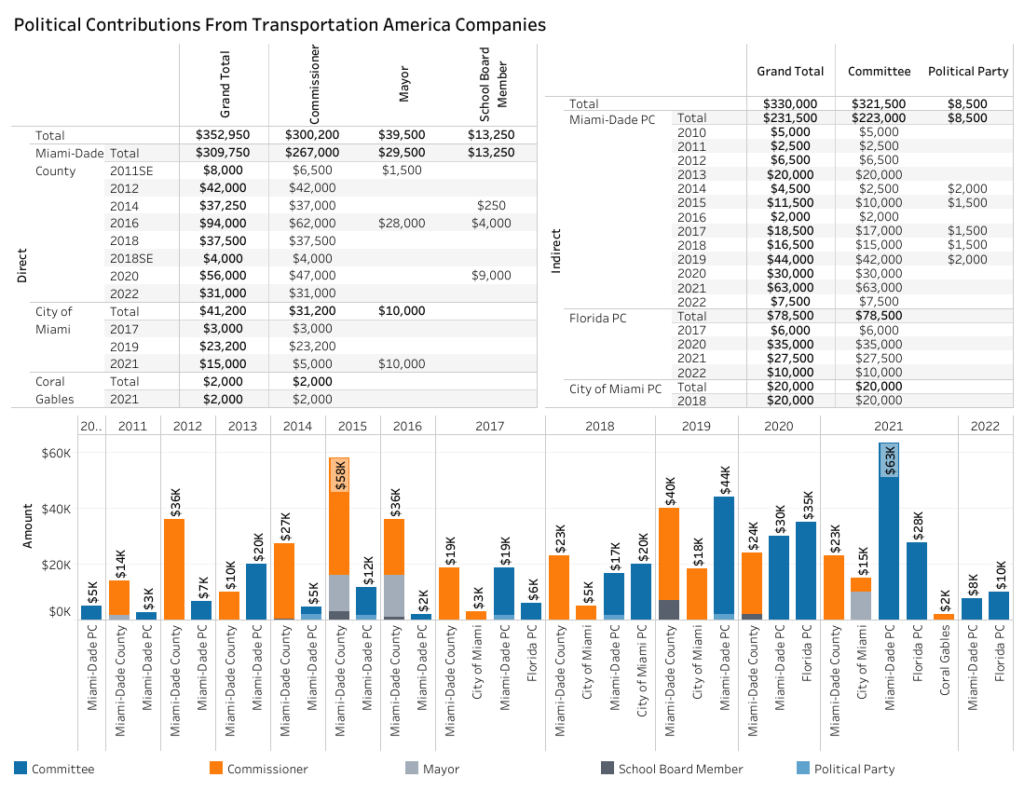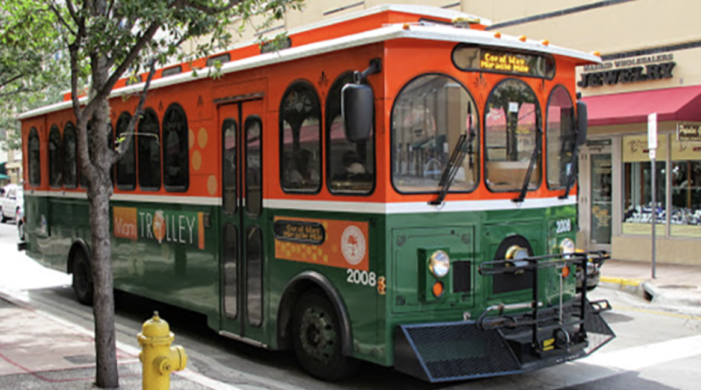Company tied to hundreds of thousands in campaign contributions
For at least five years, Miami-Dade County has been contracting out select bus routes and neighborhood circulators to a private company owned by prolific campaign contributors. Transportation America, which also goes by the names of Limousines of South Florida and Super Nice STS, has other contracts with the cities of Miami, Miami Beach and Homestead.
And that means Dani Rivera and people like her can’t get around.
Rivera has mobility issues and yet she has been working for years to bring it to our electeds’ attention that the access for the disabled provided by these private contractors is sub par. Sometimes non existent. Rivera can’t climb the steps to get up and into one of these vehicles. She needs the wheelchair lift to, well, lift her into it. And she has personally documented dozens of instances where she has been left behind, on the side of the road, because the trolley or shuttle driver couldn’t accommodate her needs.
Rivera has recorded these incidents on video. A driver says the lift is broken and the next trolley will pick her up. Only the next trolley’s driver doesn’t know how to operate the lift. Or it breaks as they are operating it. Or they never stop in the first place because they notice she has special needs. Or they simply pretend not to understand her and drive off.
That former example was actually caught on video by someone with the Miami Riders Alliance after Rivera went to County Hall to speak about the companies failures to serve all county residents in 2020.

“They didn’t let me get on to go home,” she told Ladra.
It’s gotten so bad that, first, she moved from Homestead to Miami, thinking it would be better. But both cities contract the same firm. Rivera has decided to home school her 9-year-old son because getting around is too difficult. It takes her an hour to board the vehicle to get to the grocery store less than a mile away because she often has to wait for the second or third trolley to be able to get on using the lift.
Read related: Miami-Dade CITT to city of Miami: No more 1/2 cent transit funding for you!
Then she has to pay for an uber to go home with the perishables.
“It shouldn’t be this hard,” she said.
Yet, on Thursday, the Citizens Independent Transportation Trust, a board of community watchdogs who monitor the expenditure of the county’s half-penny sales tax for the People’s Transportation Plan, will consider another no-bid contract for this same business, one worth $9.1 million.
The scandal-plagued firm has been sued by drivers, who claimed they were denied overtime pay, and by passengers who claimed they were sexually abused by drivers. But, in 2017, with the backing of then mayor Carlos Gimenez, Miami-Dade privatized 14 bus routes and gave the contract to Transportation America – who replaced unionized drivers with lower-paid non-union drivers.

“For now, we need to continue doing this in order to keep these routes operating,” said the CITT’s Executive Director Javier Betancourt, who wants to emphasize that these are not surtax dollars. The only reason the CITT is involved is because of a county resolution that has them review any contract over $1 million, Betancourt explained.
“It’s not the ideal situation. They have their limitations,” Betancourt said about the trolleys and shuttles. “We at the CITT would love to see all those routes return to county service.”
There is an appetite for that at County Hall as well, Betancourt claims.
But there is also currently a shortage of operators that has caused the rollout of the Better Bus Network — a long-planned redesign of routes and schedules to increase efficiency in high-use corridors and better connect all of Miami-Dade — to be delayed by at least a year, Betancourt said.
Amazon and other companies that pay drivers more are poaching county bus operators and Miami-Dade is having to increase salaries and offer sign-up bonuses to recruit and retain, Betancourt added. The county ought to consider showing a little more respect and appreciation to transit workers, whose lives were risked with inadequate protective equipment during the height of the COVID19 crisis.
Read related: Miami-Dade transit workers finally get COVID19 protection, riders get relief
But even if the private contract is a temporary bandaid, it doesn’t help cover people like Rivera. Ladra can’t believe it is not a violation of laws that are meant to protect people with disabilities and provide them with the same public access and amenities that everybody else gets.

Then again, Rivera and the transit workers aren’t pouring hundreds of thousands of dollars into the commissioners’ campaign accounts and political action committees the way Transportation America and its owners, Raymond and Rene Gonzalez, have been doing for more than a decade.
Rivera has had time to do the research — sitting on the side of the road — adding up the contributions from the multiple companies owned by the Gonzalez duo and their families. What she found is that Transportation America et al is the second highest direct contributor to county commission candidates since the 2011 special election. Almost $400,000 have been donated to Miami-Dade and city of Miami electeds in the last decade.
In this year’s cycle alone, the companies are also the second highest contributor in both direct and indirect donations. The Gonzalezes used more than 40 different companies to bundle contributions, a common practice to get around maximum contribution laws.
“By donating up to the max per company, they can give thousands of dollars to a candidate in a single election,” Rivera said.
And then they get these no-bid contract extensions in return.
The CITT meeting starts at 4:45 p.m. and can be seen on the county’s website.
Political Contributions From Transportation America Companies by Political Cortadito on Scribd

